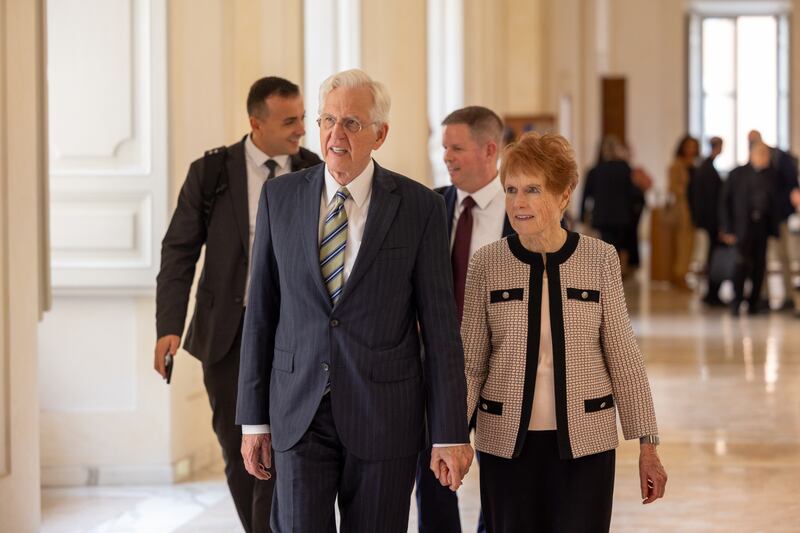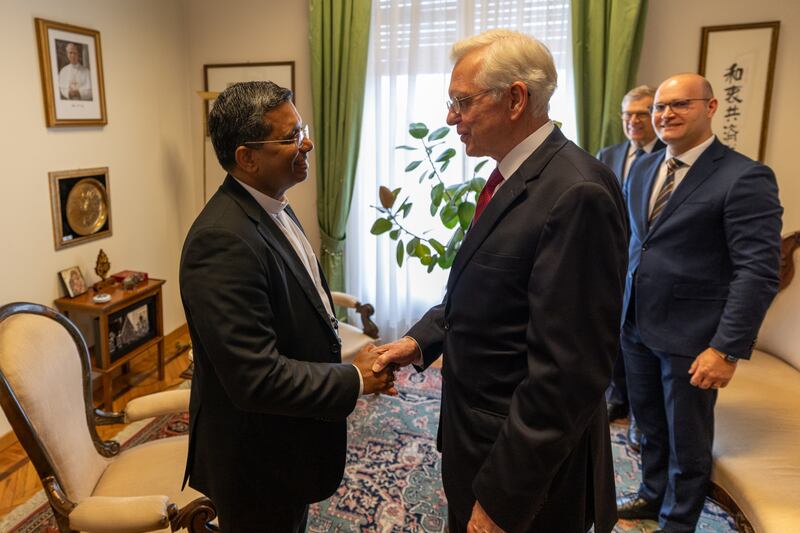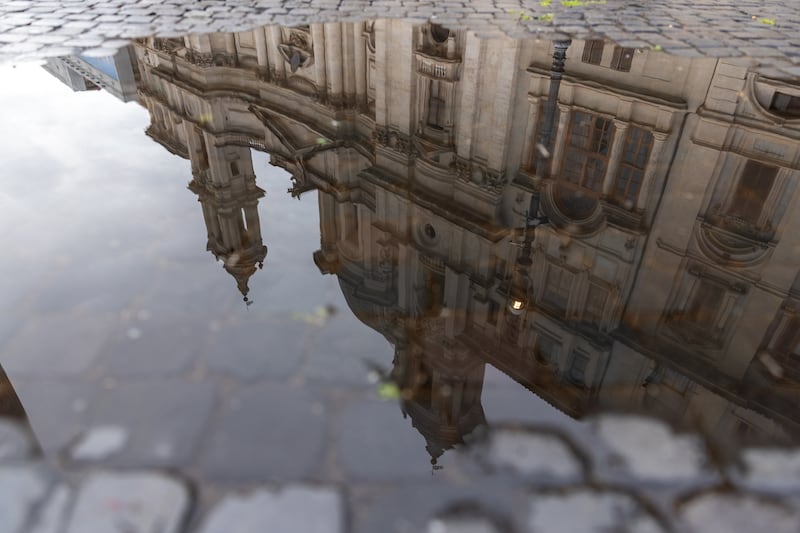Another apostle took to an influential global stage this week to call for people, organizations and societies to recognize the human dignity of all people.
“As disciples of Christ, we have a solemn responsibility to advocate for human dignity, moral agency and religious pluralism,” Elder D. Todd Christofferson of the Quorum of the Twelve Apostles said Tuesday in Rome.
His visit symbolized the bridge built over dignity between the Catholic Church and The Church of Jesus Christ of Latter-day Saints.
“I am deeply appreciative of the Catholic Church’s commitment to these concepts and for the shared values of our two churches,” Elder Christofferson said during a panel discussion.
The discussion was held at the Pontifical University of the Holy Cross, a few short blocks from Pantheon, Piazza Venezia and the Roman Forum and Colosseum just beyond it.
On behalf of President Russell M. Nelson, Elder Christofferson offered condolences to Catholics on the death of Pope Francis and congratulations for the election of Pope Leo XIV.
The meat of Elder Christofferson’s presentation was his praise and agreement with the Catholic Church’s long standing leadership on human dignity.
He specifically cited three major Catholic documents from 1891, 1965 and 2024.

‘Infinite Dignity’
The 2024 document is titled “Infinite Dignity” (Dignitas Infinita). Pope Francis approved it, and it was the theme of this week’s conference.
“Every human person possesses an infinite dignity,” the declaration states, “inalienably grounded in his or her very being, which prevails in and beyond every circumstance, state or situation the person may ever encounter.”
This dignity, it states, is rooted both in reason and the biblical teaching that all people are created in God’s image and redeemed in Jesus Christ.
“This infinite dignity creates for each human person a responsibility to treat every other human person with love and respect,” Elder Christofferson said. “This is not an abstract duty. It is rooted in the person and example of Jesus Christ.”

Latter-day Saints believe that all people are spirit children of God, a concerted point of emphasis by leaders of the Church of Jesus Christ in recent years.
Elder Christofferson said he was thankful for the Catholic treatise.
“I am deeply grateful for this document and its assertion of gospel truths, which provide us with a reminder of the divinity of Christ and our responsibilities as his disciples,” he said. “I am also grateful for this particular conception of human dignity, which among the many other conceptions, is clearly and profoundly centered not just on the truth that we are created in the image of God, but that Jesus Christ is our exemplar and our Redeemer.”
‘Human Dignity’

Elder Christofferson also called Pope Paul VI’s “Human Dignity” (“Dignitatis Humanae”) a “monumental achievement in the history of religious freedom.”
He called it a significant theological explanation for why human dignity is the basis for the right to religious freedom and why all people have a social duty to protect it and promote it as a sacred right.
“‘Dignitatis Humanae’ importantly recognizes that the shared responsibility for promoting and preserving religious freedom lies with governments and individuals,” he said.
Elder Christofferson also noted that the document counsels people to deal “in justice and civility” with their brothers and sisters, another common emphasis between leaders of the two faiths.
“I join with Pope Paul VI,” he said, “in declaring that ‘in order that relationships of peace and harmony be established and maintained within the whole of mankind, it is necessary that religious freedom be everywhere provided with an effective constitutional guarantee and that respect be shown for the high duty and right of man freely to lead his religious life in society.’”
“New Things”
Elder Christofferson said religious leaders are a critical voice in public debates and can use a focus on the shared dignity of humans on all sides of conflicts to lead the world toward “more peaceful, loving and tolerant societies.”
He said a good example of such an effort was Pope Leo XIII’s 1891 pastoral letter “New Things” (“Rerum Novarum”).

Socialists and capitalists were debating the rights and duties of capital and labor at the time. The pope focused on principles of duty, labor, virtue and charity, Elder Christofferson said, emphasizing “the inherent moral qualities of humans and the importance of treating all men with dignity.”
Leaders today also should engage with major issues of the day while “refusing to align with the extremism of either side,” he said.
Elder Christofferson said President Nelson is an example of this style of leadership and shared some of the church president’s teachings about human dignity and peacemaking from his recent Time Magazine essay.
“Each of us has inherent worth and dignity,” President Nelson wrote. “I believe we are all children of a loving Heavenly Father.”
Other pieces of the leader’s essay shared by Elder Christofferson included:
- “But no matter your religion or spirituality, recognizing the underlying truth beneath this belief that we all deserve dignity is liberating — it brings emotional, mental and spiritual equilibrium.
- A century of experience has taught me this with certainty: anger never persuades, hostility never heals, and contention never leads to lasting solutions.
- If we embrace these eternal truths — honoring our own worth, treating others with dignity, and nurturing our families — our lives, and our world, will be steadier and more joyful.”



